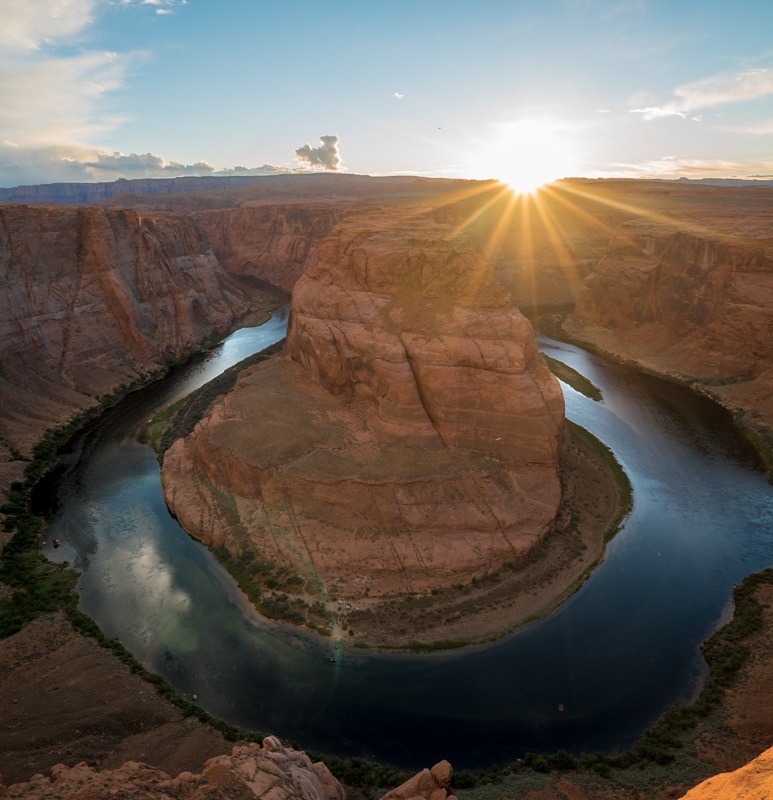From the legendary Havasupai Reservation to the depths of the Grand Canyon and over to enchanting Sedona, Arizona is a treasure trove of gorgeous waterfalls. The otherwise arid landscape might make it sound unlikely that Arizona has such abundant waterfalls, but thanks to flowing rivers and rocky cliffs, you’ll find plenty.
Some of these are more challenging to get to than others, so here’s a guide to the best waterfalls in Arizona, complete with how to reach them and even a few camping suggestions:
1. Havasu Falls
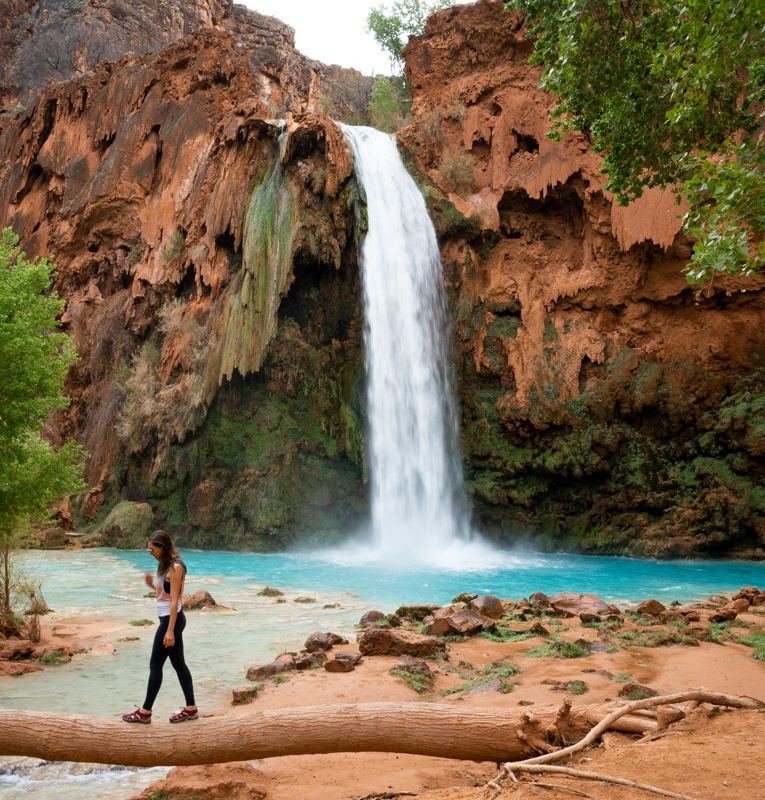
The bright turquoise water isn’t a trick of photoshop; it’s the real deal at Havasu Falls! The water gets its color from a unique combination of minerals. Plus, the reddish-orange rocks all around it sure help make the color pop.
Getting to this waterfall requires a 10-mile hike, though. You can find everything you need to know about reaching Havasu Falls here, complete with permit information and camping recommendations.
2. Beaver Falls
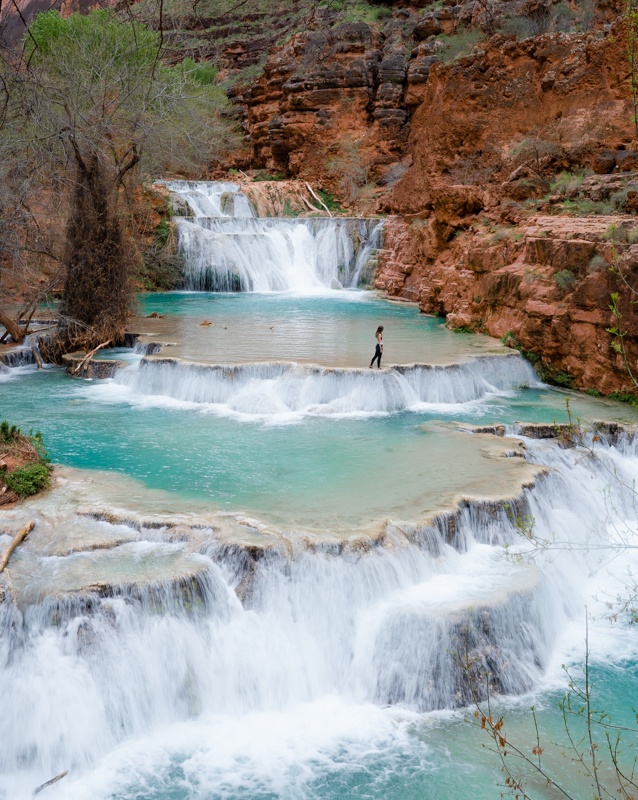
Most people check out Beaver Falls while they’re exploring the Havasupai Reservation, most notably Havasu Falls. The tiered pools full of flowing baby-blue water are great for swimming. Just make sure to be careful near the edges so you don’t get swept away!
Once you get to the Havasu campground, Beaver Falls is an 8-mile round-trip hike away. Make sure to leave early in the morning so you’ll have plenty of time to explore the waterfall.
3. Mooney Falls
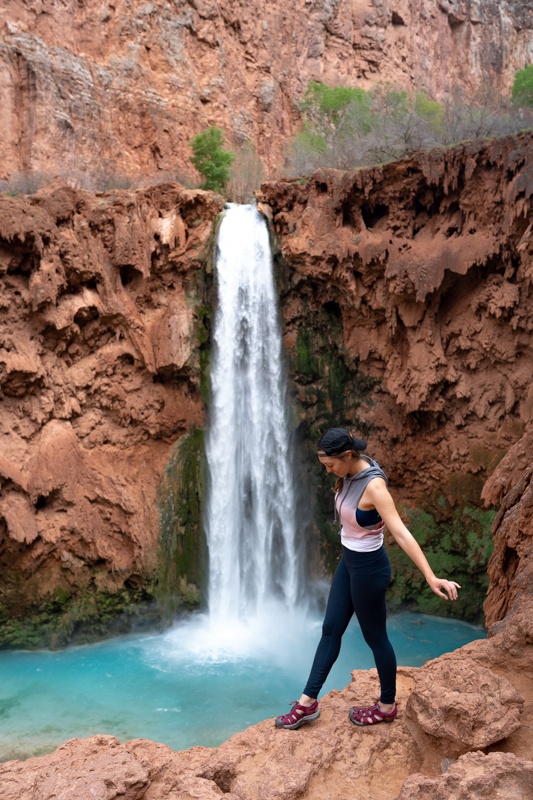
Mooney Falls is actually only a 3/4-mile hike from the Havasu campground, on the path to Beaver Falls. Towering 200 feet tall, this waterfall is one of the grandest in the area.
It’s a bit dangerous to get to the bottom of, so some visitors decide to admire it from above. If you do decide to make the difficult climb down to the bottom, the view is gorgeous and you’ll be able to swim in the idyllic pools below.
4. Fifty Foot Falls
Misty streams of cascading water over bright green moss make Fifty Foot Falls a can’t-miss during your stay at the Havasu campground. You can hike directly up to this waterfall and feel the mist on your face as you approach. The limestone formations make it even more special, with columns that look like the rock is literally dripping down the cliff’s edge.
Fifty Foot Falls is a 1.25-mile hike from the south gate of the campground, at the end of a narrow trail. It’s not as popular as the other falls, so it makes for a more secluded and peaceful visit than Havasu Falls.
5. Navajo Falls
So you’ve made it to Havasu Falls, Beaver Falls, and Mooney Falls, and you’re still looking for a cascade adventure. You’re in luck, because Navajo Falls is another awesome waterfall just a short hike away from the Havasu campground. It’s also a great alternative if Havasu Falls gets overcrowded, which happens often during high season (summertime).
There are two sets of streaming waterfalls here: Upper Navajo and Lower Navajo. A lot of people miss out on the upper falls because they’re a bit more hidden, so consider climbing up the narrow path to get an even better view of both sets of waterfalls that make up Navajo Falls.
6. Ribbon Falls
Located in Grand Canyon National Park, Ribbon Falls is a mossy green oasis among the surrounding reddish desert rocks. Whereas most of the park is dry and dusty, this is a welcome change and an excellent place to cool off after hiking.
The best way to get to Ribbon Falls is to take the North Kaibab Trail. The trailhead starts at the north rim of the Grand Canyon, roughly 1.5 miles from the Grand Canyon Lodge. From there, it’s a long 8.4-mile hike. Consider taking on the trip over a couple of days, and camping at Cottonwood Campground.
7. Deer Creek Falls
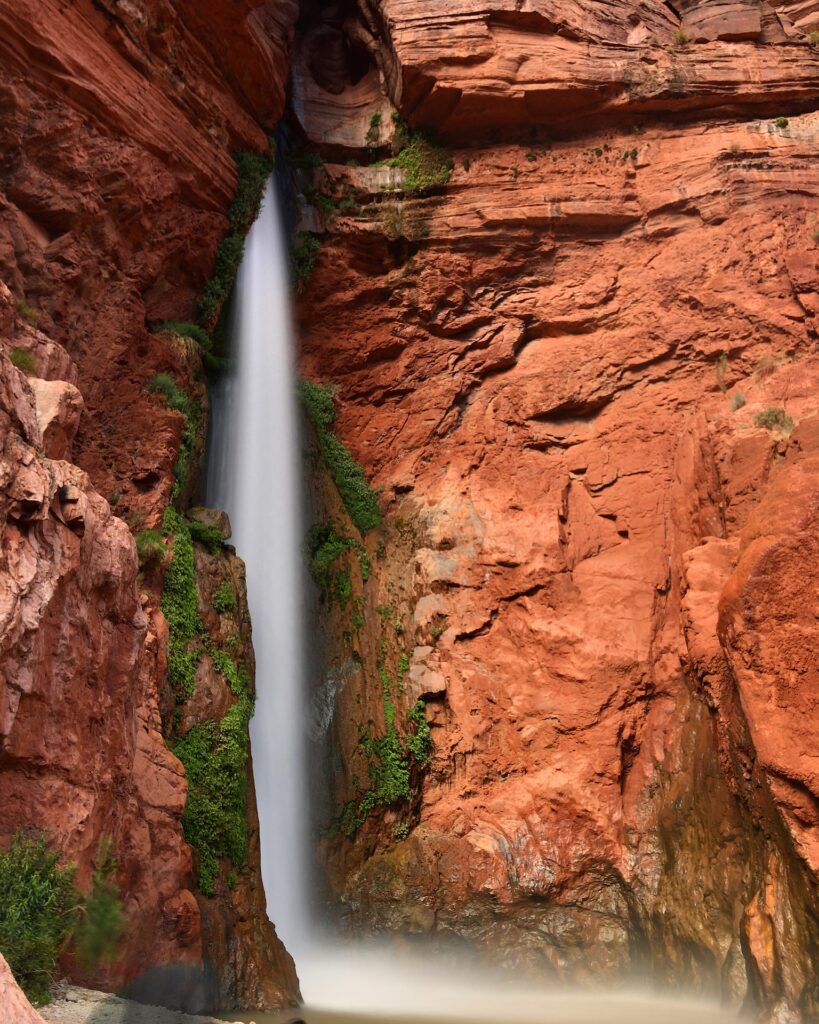
In the Grand Canyon, where Deer Creek meets the Colorado River, you’ll find Deer Creek Falls. This impressive waterfall is 180 feet tall; you can access its beauty by backpacking or rafting. A backcountry camping permit for Grand Canyon National Park is required to get there.
If you decide to backpack, you’ll hike 4 miles to Esplanade via the Bill Hall Trail (north Rim). Stay the night at the Esplanade campground. Then, you’ll hike 6 miles to the Deer Creek campsite and stay there for a night. The last leg is to hike for 4 miles from there to Deer Creek Falls.
It’s a long journey, with a ton of flora and fauna on the way. If you decide to raft there on the Colorado River, you’ll find this waterfall at mile 136.9.
8. Fossil Creek Falls
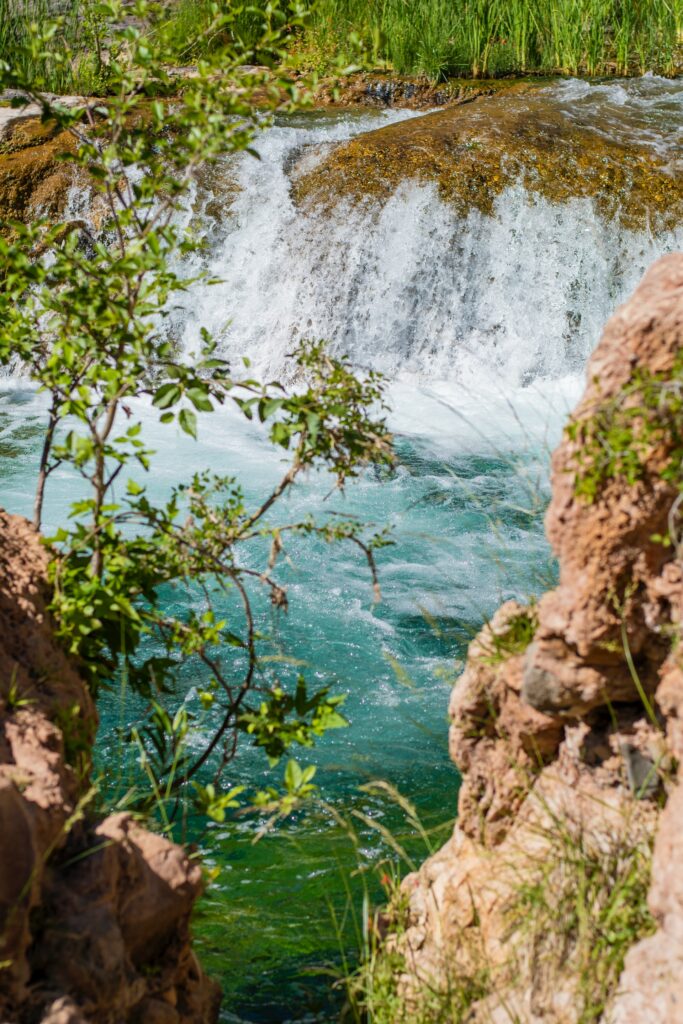
You’ll need a 4×4 vehicle to get to Fossil Creek Falls, so pack up your car with plenty and food and water and prepare for some rocky, winding roads. The 21-mile bumpy ride on Fossil Creek Road will take you to a parking lot. From there, it’s a quarter-mile walk to the trailhead and only about a mile from there to the waterfall.
The landscape around the creek is rocky, with sprigs of greenery speckled about. The water has glistening shades of blue and green, which reflect the blazing sun overhead, setting the scene for a lovely day of swimming and hiking. There’s even a 25-foot rock ledge that more daring visitors can jump from into the crystal-clear pool below.
9. Grand Falls
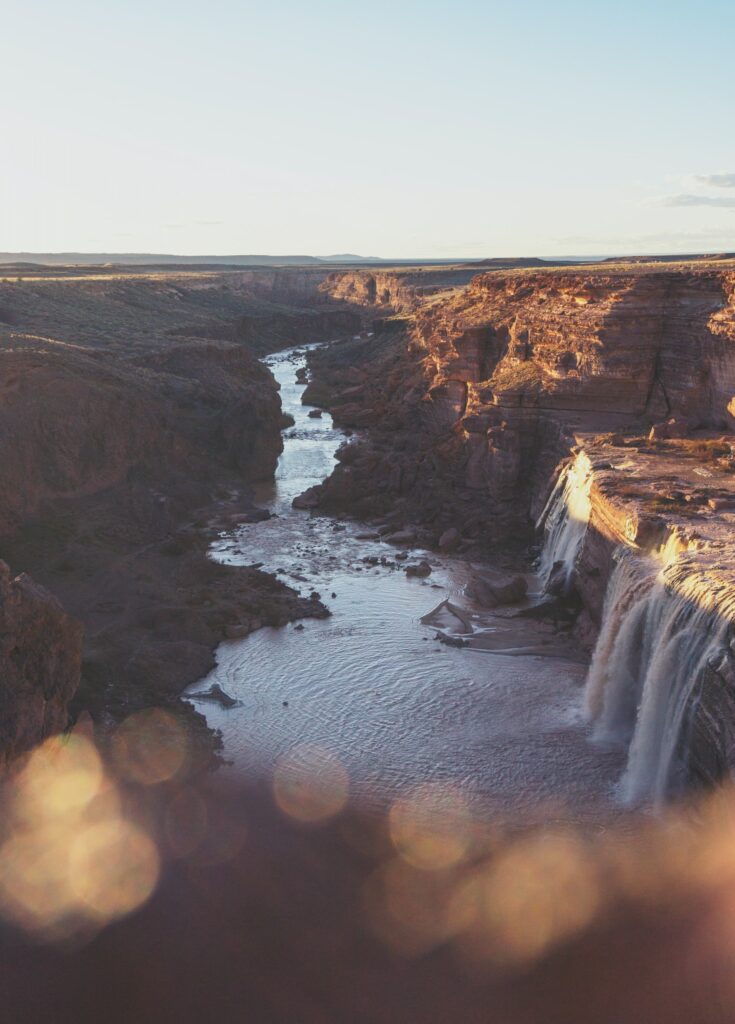
Also known as Chocolate Falls, this towering waterfall has muddy water that resembles sweet cascades of chocolate, reminiscent of Willy Wonka and the Chocolate Factory. You’ll find this waterfall on Navajo Nation land within the Painted Desert, making it a perfect stop on any Southwest USA road trip.
Not only is this 181-foot waterfall a sight to behold, but also some spectacular rainbows have been known to emerge as a result of the mist it creates. Find more info on how to get to Grand Falls here.
10. Slide Rock
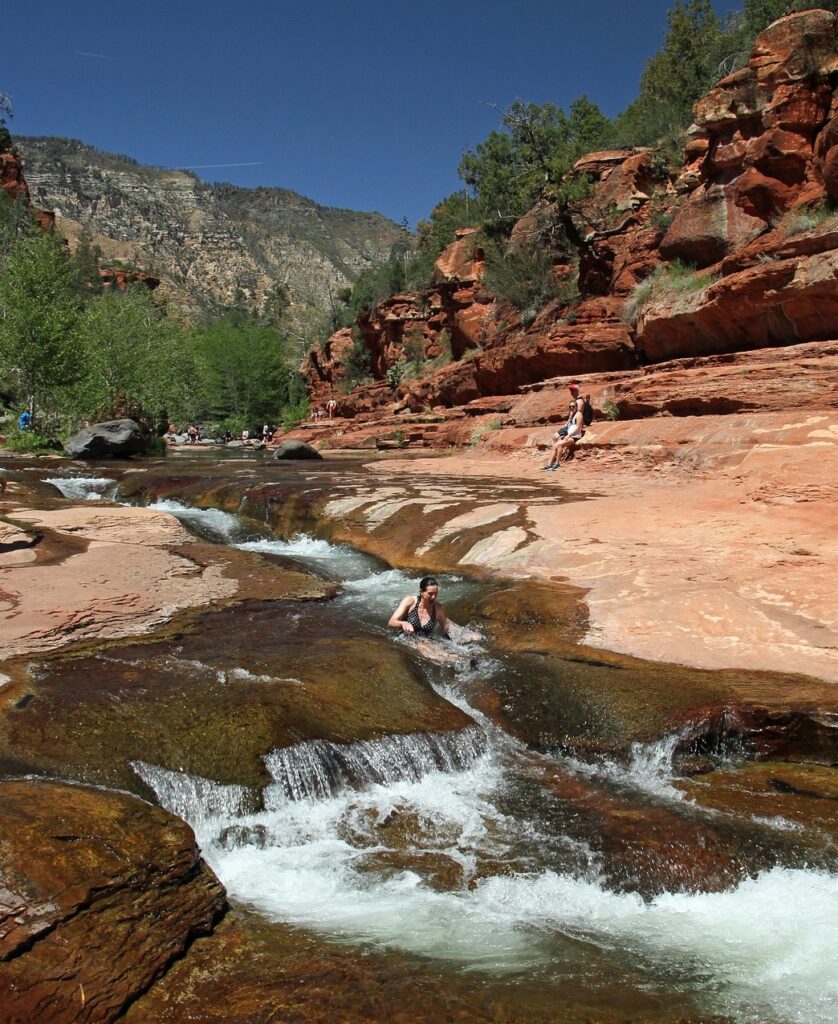
As you can see, this playful waterfall makes a perfect slide to glide down on a hot summer day. It’s part of Slide Rock State Park, which was once a 43-acre apple farm in Oak Creek Canyon.
Out of all the waterfalls on this list, this one is the easiest to get to. Find more info on how to visit Slide Rock here.
Slide Rock is just outside of Sedona and attracts droves of visitors in the summer months, so be prepared for crowds if that’s when you’ll be visiting. For the best chance at avoiding a crowd, check it out during the week or just avoid going in the summer months altogether.
11. Seven Sacred Pools
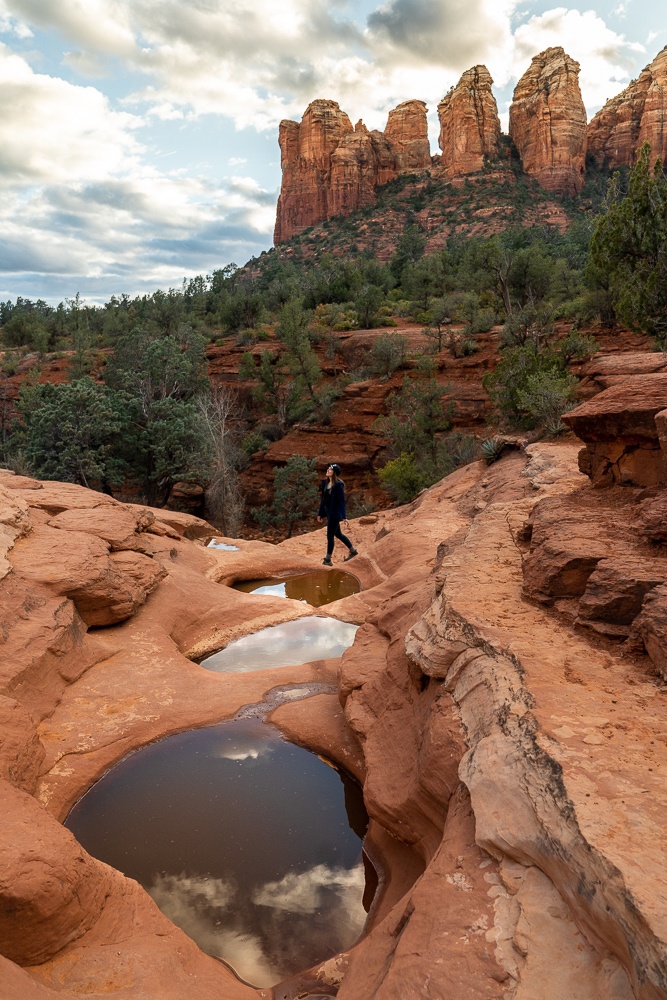
Also in Oak Creek Canyon near Sedona, Seven Sacred Pools is a collection of pools formed over thousands of years of erosion. Instead of a rushing waterfall like the others on this list, here you’ll find a gentle downward stream at the edge of the pools. It’s the perfect place to get some peace and solitude, with the red desert surrounding the pools creating a lovely backdrop.
You can reach Seven Sacred Pools by hiking along Soldier Pass Trail. The hike to the pools from the trailhead is about 2.5 miles round-trip. The parking lot is quite small, so get there as soon as the trail opens at 8am for the best shot of getting a parking spot.
The ideal time to go is during the rainy season in July and August, when you’ll have the best chance to see the waterfall trickling down. May and June are the hottest months; the pools might actually be dried up, so that’s not a great time to go. Also keep in mind that there is no camping permitted on the trail or near the pools.
12. Cibecue Falls
Arriving at this jaw-dropping cascade is a worthwhile experience on its own, but the added bonus is that there’s plenty to see on the way as well.
You’ll need a 4×4 vehicle to reach the trailhead, as the rocky road can be a challenge to navigate and you’ll have to cross Cibecue Creek. Once you cross the creek, you’ll see the trailhead; from there it’s a 3-mile hike to the waterfall. You’ll need a permit to access the trail. More permit information here.
Map of Arizona’s Best Waterfalls
***
You’re going to have a blast exploring Arizona’s best waterfalls! As you can see, many of these are clustered. Pack your bags and see how many waterfalls you can see during your trip.
Do you know of any secret waterfall spots in AZ? Let us know!
There has never been a better time to plan your next trip and make your Dream vacation a reality . Whether you've been dreaming of relaxing on a sun-kissed beach, exploring ancient cities, or embarking on an epic adventure, now is the perfect moment to make it happen.



